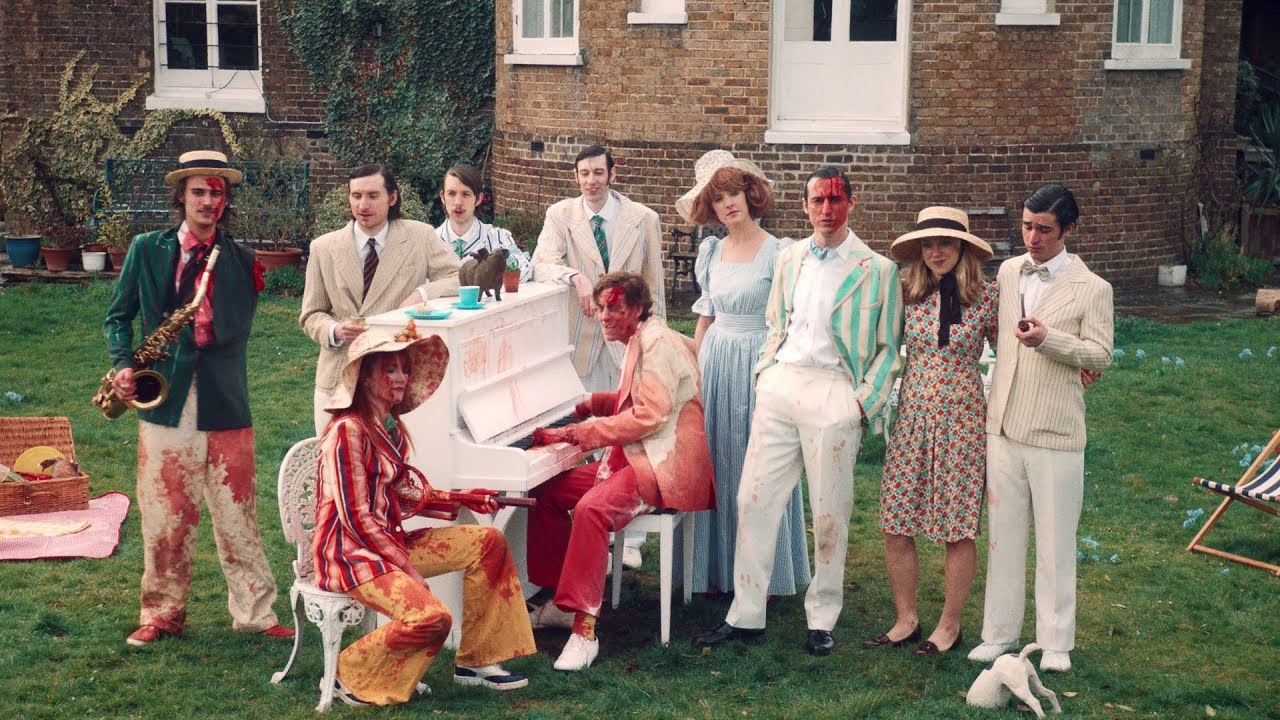Photo by Duncan Stafford
The narrative surrounding Fat White Family has usually concerned frontman Lias Saoudi and guitarist Saul Adamczewski. They have been considered the central creative partnership of the group, a flawed, frayed and fractious partnership, but central nonetheless. It is the two of them who might first come to mind when one tries to picture the band, Saul’s intense glare and gnarled smile, Lias’ wild and simmering stage presence. But when it comes to the band’s third record Serfs Up!, for the first time Lias’ brother Nathan, the band’s keyboard player, is of equal importance.
Nathan, Lias and Saul are responsible for around a third of the record each, I’m told, as I meet the brothers Saoudi at The Trinity Arms pub in their once-native South London, along with the band’s saxophonist Alex White. Lias is affable and polite, while Nathan arrives last, more distant and standoffish than his elder brother. Each of the three orders a Guinness, and rolls a cigarette as we take a seat in the beer garden. Before long a fish finger sandwich arrives for Lias, but he says he’d consider it rude were he to start eating until we’ve finished the interview.
Serfs Up! is a tremendous album, a sonic volte-face into driving, luxurious pop that was recorded in their newly established Champzone Studios in Sheffield, and released via new label Domino. The first review came in from Mojo a few days previously; "The Fat White Family have survived their ordeal" it proclaimed. From the outside it can sometimes seem like the group’s entire existence is just one ordeal after another, so I ask how much that’s true.
“Survived what ordeal?” says Nathan, immediately on edge. “What ordeal? I can’t remember!” He knocks his head and makes a hollow clicking sound, then laughs wildly to himself. Lias is apparently more concerned with weaving the right narrative.
“We were reacting to life in all the wrong ways. Endemic substance abuse, a complete breakdown in communication, seriously ill health, violence…”
“And too much love!” Nathan interrupts.
By September 2016, when they concluded their support of second album Songs For Our Mothers with a colossal homecoming show at the Brixton Academy, the band was in tatters. Blighted by drug addiction, exhaustion and arguments, Saul had left the group. “We’d half sacked him, he’d half resigned,” says Lias. This meant the group were in breach of contract with their label PIAS. They were offered a gestural, much less lucrative re-signing deal, but as Nathan puts it: “It’s like when somebody doesn’t want you in their house and they pay for your taxi to get out…”
“We were half sacked, we half resigned.” says Alex.
After the Brixton show, the band were at pains to get as far away from each other as possible. Nathan went to Mexico to get off heroin (although he’s keen to point out that it wasn’t rehab), Lias to South East Asia, Saul to New York, “and Alex was just in the hairdressers for four months,” says Nathan, with a glance at his bandmate’s luscious mullet. There was a brief reunion of sorts when Saul asked Lias and Nathan for their help with his Insecure Men album. The sessions were unlike anything The Fat Whites had experienced; they were structured, regimented and smooth.
“It was really compartmentalised, we all had different jobs, there was no grey area,” says Lias. “There wasn’t a lot of knocking heads on that one. In fact, it was really fun and really easy…”
It’s a shame the same can’t be said of Serfs Up!. Though the idea of the record – Fat Whites go pop – was first floated during the Insecure Men sessions, it was a while until they fell into shape. In the time being the band relocated to Sheffield and established Champzone, an attempt to carve out the kind of space not afforded to them in London. “Because it was essentially just us three and Adam [Harmer, guitarist]” says Alex, “we were just in this dark little room on the edge of a canal. It was really, really nice, we’d just take a bit of ketamine and try and come up with stuff, for weeks on end. In London all the temptation is right on your doorstep.”
“We’d microdose acid then do a bit of ketamine in the evening,” Lias clarifies. “It was starting from ground zero, a completely new thing. It was like going back to square one when we were in our little house in Peckham, and nobody gave a shit and we didn’t really know anybody. That was good, it was like a reality check. What is there to do? Well it’s music and that’s pretty much it. After all that madness.”
Nathan, as ever, is the bluntest of the three. “‘What are you doing this weekend?’ ‘Well I’m in Sheffield, so fucking nothing.’”
It was Nathan that headed up the formation of Champzone which, in addition to newfound budget from new label Domino, allowed the group to pursue grander creative ambitions. “He was like a madman,” Alex recalls, “looking for the exact pieces of equipment that he thought would sound best, we did sort of choose all the things that we wanted to make sound with, it wasn’t like someone else’s studio where we were using what we could.”
“It was really incredible what he did but it was also a descent into obsessive madness,” says Lias of his brother’s toils. “I used to find these bits of paper all over the house with machinery numbers, figures and budgets, it was quite manic.”
Saying goodbye to the joy of semi-notoriety in the capital was not for everyone. Former drummer Severin Black didn’t last long up north: “He didn’t know anyone and more importantly no one knew him,” jokes Alex. “His Instagram wasn’t popping so he had to move back to London.”
“I think that’s unfair on Severin,” Lias counters. “I think to expect him to move randomly up north and live in a terraced house and sit in a studio in an industrial estate every day and give up your entire social life, it’s kind of a big ask.”
“It’s what’s required!” Nathan jabs.
Lias presses on. “One of the good things and one of the pitfalls of being in a quasi-well-known London band is there’s usually somewhere for you to piss about, hang around and blow your own trumpet like a wanker.”
His brother goads him again: “Blow your own trumpet like a wanker? Dude, that’s you!”

Photo by Sarah Piantadosi
Lias winces but doesn’t take the bait, maintaining eye contact with me as the ash on the end of his cigarette grows longer. “I felt anxious that we wouldn’t be able to plug the Saul gap, but in a way that was a healthy thing,” he says of Saul’s absence from the record’s formative stages. “I had to start writing more melody. I used to write one or two tracks on an album but this time everyone had their own little stockpile by the end. Saul showed up after 9 months anyway. We didn’t have a whole album’s worth until that.”
“But we did have a decent chunk of material,” says Alex, “the kind of material we could have released had Saul never shown up again, although it wouldn’t be the album it is, by any stretch.”
This idea of Adamczweski as the final, essential piece of the puzzle, clearly rankles with Nathan, given the amount of work he put in given the guitarist’s absence. “Hang on,” he interrupts, with a rising frustration in his tone. “[Unreleased track] ‘Giving Up For Lent’ was on that album, if that was on the album we’d be in LA by now. I don’t like this talk of ‘Saul came in when we didn’t have enough material.’ We did have enough material, and we kept cooking.” He turns his gaze to me. “Saul was too controlling! All the time you’d be sat there playing stuff and he’d literally move your fingers. It’s like, ‘this guy’s a dick! Fuck off out of my life for a bit so I can get my shit sorted!’”
Lias stubs out his cigarette and turns to his brother. “Come on,” he says, adopting the serious tone of an older sibling re-establishing his authority. “It wouldn’t have been nearly as good as if Saul didn’t come back. I refute that. ‘Fringe Runner’ is one of the bangers on the album, ‘When I Leave’ is absolutely banging, and those are Saul’s tunes through and through. The articulate music on the album is Saul’s, and what he brought to the ideas we’d already established was fucking great as well. I wouldn’t for a second put down his contribution.
“It was difficult because although Nathan’s got his own vocal criticisms of Saul, Nathan had his own like, psychological and spiritual nadir and refused to record the album with Saul the day before we were scheduled to do it. At this point in time we had a vintage bottle of Saul on the table,” Lias continues, as Nathan and Alex can’t help but laugh at ‘vintage bottle of Saul’. “He was at his most clean and his most lucid. He’d never been like that before; he was working around other people’s ideas. He’d turned a corner and that was really obvious to me, but Nathan was really still hung up on the negative and gnarly trauma of the past. When Saul was really in the throes of crack and smack, yeah, he was fucking terrible. He was really difficult to work with. But in the end, it all lined up perfectly. Everybody was on the same page, I had four tracks, Nathan had four tracks, Saul had four tracks, we’d agreed to do these tracks with these people in our own studio and develop the whole thing, but then at the last minute Nathan basically, I’m not sure if he resigned, or was asked to leave, or quit, or a mixture of everything, but he kind of missed out on the first bunch of sessions because of that.”
Nathan is itching to have his say. “Me and Saul, as mates, we get on,” he says pointedly. “Big time. And it’s water under the bridge now, but professionally there’s always that thing of two concentrated people. But he’s got a track record and I don’t. When I’m in the studio and people are listening to him rather than me, I think ‘how do I break this? I’ve got to cause a bit of a fucking war here’. There’s no other way around it. Diplomacy at that point would never have worked.”
‘Feet’, the lead single that announced the band’s return at the beginning of this year, was something of a flashpoint for these tensions. Judging by the tone of our conversation, by now akin to a marriage counselling session as the brothers air their grievances indirectly through me, it still is. Initially, the song was Nathan’s, and his version is available as the B-side to the 12” vinyl release. It was Saul’s return towards the end of the session that shaped it into the searing disco-infused banger that became the lead single. “There was a power vacuum after [Saul] left, Nathan tried to fill that vacuum, and in a lot of ways his behaviour started to reflect Saul’s in a way, it was like monkey see monkey do,” says Lias. His voice is still calm and composed, but the fuse has now been lit.
“What?!” Nathan shouts.
“Nathan, if you’re going to sit and dish out shit about Saul to the press…”
“What shit have I dished out?”
“Calling him a dick and everything, in front of-“
“Well he was a dick!”
“Nathan became quasi-dictatorial,” Lias says to me.
Does Nathan think that’s fair? “No I don’t. Not at all,” he says. “The version [of ‘Feet’] you released wasn’t as good as the version that I had, and it still isn’t! It’s on the other side of the vinyl. Is freedom of speech not allowed within a band, even?”
Lias retorts: “I was just stressing an opinion that you started inhabiting some of the sort of the worst aspects of Saul’s previous behaviour. It’s OK, I understand why you would do that. Who’s been the sonic architect up to that point? Saul. Then he’s gone, and there’s these big shoes to fill, so you adopt similar behaviours. It’s not like a mad insult, that’s how I felt at the time.”
By now, I’m no longer the middleman. “He asked me a question about how I came to write the songs, and why I wanted to write them,” Nathan says to Lias, “and I explained very clearly that in the studio I was previously never given the freedom to express myself, and that was because of Saul being a bit of a dick. I’m not lying, I’m not stirring anything up. Like I said, we’re on fucking good terms now. Now you’re saying I was dictatorial. I was dictatorial over one song because I had a very clear vision of a very strange song.”
“I would say there was a kind of period where, and this was a qualm I had for a while, but you did become a bit of a Hitler when you were up there in Sheffield,” Lias responds. “And I understand why and I empathise and it’s over now and we got good results out of it, so it’s fine. And yeah, sure, you’ve got to level criticism at Saul’s behaviour in the past because yeah, he was fucking unbearable for a while. Nathan had gone down this mad tunnel where he was forging a sort of creative language for the first time, he’d been given space. With me and Saul there was a dynamic that had long since been established where, even through the cloud of hard drug abuse, and hating each other one minute and loving each other the next, we could still just kind of work.” He snaps his fingers. “But Nathan’s kind of thing I guess, when you start writing songs it can be really hard to let go of them. Nathan had the goods creatively, but there’s a sort of like, etiquette in the studio around collaboration which is a totally separate skill which takes quite a long time to learn. You need to know when to back the fuck out with people, when to let somebody else’s ego ride over yours, to try and pick out who’s more important at what moment and cool it and sit back. That’s not something you just learn, that’s like ten years of working in bands and I kind of can recognise it now.”
“Well so can I, man!” Nathan butts in. “I’ve also been in a studio. You’re ignoring the rest of the stuff I’ve done, the freedom and collaboration I’ve done with everyone. [‘Feet’] is one specific song, and the proof is in the fucking pudding here, it’s on the vinyl. I wanted it to be aggressive and very soft at the same time. I didn’t want it to go in the middle, I wanted it to be stretched, that was part of the mood of the song. That was the one song I was really dictatorial about because this is a much cleaner, much more succinct, much more direct vision of what this song should be. If I ever get my hands on a song like that again that’s come out of my body, I will be the same way, I’ve recorded about 18 songs and I invite everyone in, ask them where they see it going, we’ve done loads of songs together and it’s like ‘get on the mic man I want to see what you’re gonna do’. This one particular song, I had a real problem with, and it’s still there.”

At this point, the interview descends into incomprehensible bickering, before Lias threatens to terminate the interview altogether. “Perhaps we should just change the subject?” says Alex, who after realising that he’d struggle to get much of a word in, has spent the last ten minutes enjoying a bowl of soup. What’s telling, is that for all the squabbling and tension, and perhaps even because of it, The Fat Whites have returned from Yorkshire with a compulsive LP, one that proves beyond all reasonable doubt that for all the tales of grot that they carry around with them, they are one of the most acute, penetrating bands of their generation. Serfs Up! is a fantastic record, one that refuses to bend to the grubby clichés that the band have become unfairly saddled with. The new record maintains the band’s indefatigable will for provocation, their embrace of the sordid, and their obsidian-black sense of humour, but more than ever it finds coherent shape in their sweeping haul of cultural influences, from Wham!’s ‘Blue (Armed With Love)’ to the “sheer bombast” of Kanye West’s Yeezus; from Jean Genet’s posthumously published accounts of encounters with The Black Panthers and Palestinian soldiers, Prisoner Of Love, to copious amounts of ketamine.
The overall picture painted on the record is more than a little homoerotic, I suggest, in an effort to bring conversation back to this tremendous new record, rather than the bust-ups which surround it. There are songs like ‘Oh Sebastian’, a sickly-sweet romantic ode to Alex Sebley of Pregoblin, and the phallic allusions of ‘Kim’s Sunsets’, which finds Kim Jong-Un staring out over a missile silo, his finger quivering over the big red button. Most explicitly there is the video to ‘Feet’, a sexually charged melodrama of love and war that alludes to the wild, veering extremities of emotion the band’s members feel for one another. “Well we weren’t seeing much of the opposite sex up in Sheffield!” Nathan jokes, as tensions begin to simmer down.
“It was a little bit like Das Boot,” Lias agrees. “Genet was the lyrical bedrock for the album. There’s an element of his writing where if you don’t apply your own brain to it it’s kind of meaningless. You have to endeavour with it. It’s really pretentious, but attempting to do something of a similar ilk but in a pop record was something I thought I’d like to do.”
The skin-crawlingly evil ‘When I Leave’, meanwhile, is envisaged as a response to ‘The Lady With The Braid’, Dory Previn’s anxious and desperate tale of a pleading sexual encounter. “It’s trying to write the male character who’s at his wit’s end, but to make him as sinister as possible,” says Lias. “A complete, complete bastard, it’s much worse than she thinks.” I wonder, does Serfs Up! have something specific to say about masculinity? “I think it’s inevitable that you say something about masculinity if you’re a bunch of men making an album about anything,” the frontman continues. “Even if you totally avoid the subject you still write from that perspective. I didn’t say at the beginning of it ‘I’m gonna write a treatise on the contemporary nature and pitfalls of masculinity.’”
“Lyrics aside it’s a bit of a piss take of masculinity,” adds Alex. “Like [album track] ‘Fringe Runner’, which has these overly macho, stupid greased up gay bar beats. I think sonically it’s too macho and that’s obviously tongue in cheek.”
Before long, tensions have eased significantly. It’s notable how quickly this happens. All three are in surprising harmony when I ask where exactly their ambitions lie for The Fat White Family. “Our ambition is to not be shit,” says Nathan. Lias agrees.
“Doing a third album and putting out and touring, that’s great and that’s the immediate future, but hopefully it just bides you time to work on other projects. I don’t think anyone expects to like, get rich or anything anymore, doing this kind of thing. I guess we just want to keep making stuff, whether its music or in another medium. To not be shit and investigate your art with new and interesting people.”
“That was the kind of question they’d ask you at the job centre,” Nathan tells me. His bandmates laugh.
Whatever the band’s vision of the future, and whatever the ordeals they’ve survived thus far, what must not go underplayed is the stature they’ve established, one that has steadily risen under the surface of the controversies, spats and feuds that too many define them by. To say nothing of the cornucopia of projects that have sprung from the group themselves, the Fat Whites are now heralded as the progenitors of a ‘South London scene’, and have inspired a raft of imitators from whom they stand far, far apart. “When you look at people who are coming up now and ten years our junior there’s a pedestrianism that’s become the status quo, and a lack of willingness to explore really difficult ideas and to bare in an honest way the dirt on your own soul in the public forum. There’s a lot of bands that pay lip service to the liberal media in the form of virtue signalling, these advocates of political correctness,” says Lias. He adds a touch of modesty: “We’re just copying the people we love, whether it’s Lou Reed or Mark E Smith or Ben Wallers, or whatever.”
In that time, 33 members have come in and out of the Fat White Family. “It’s because we’re masters of pragmatism,” he says, tongue in cheek. “I like to think of myself as a flaccid Mark E. Smith,” he continues. “I think when you get new blood in they’re not all fucking jaded and bored and hateful. There’s a core croup that’s me, Nathan, Saul and Adam, and now Alex has come in too.”
“He’s trying to penetrate the core, like in Independence Day,” offers Nathan, along with an impression of Randy Quaid maniacally ploughing into the alien mothership to save humanity.
“One of the first things Lias said to me was that this band chews them up and spits them out again,” says Alex. “They start off fresh faced and really enthusiastic then you pour gallons and gallons of booze down them for months on end, invariably they’re not quite as sunny as they started out.”
“But we want to cash in on each other’s ambitions, not shoot them down,” says Lias.
As we wrap up an interview as tumultuous as this band themselves, I ask if there’s anything they’d like to add as a parting word. “That there’s too much love in this group,” says Nathan. He’s being sarcastic, but he’s probably right.
Serfs Up! is out on April 19 via Domino




